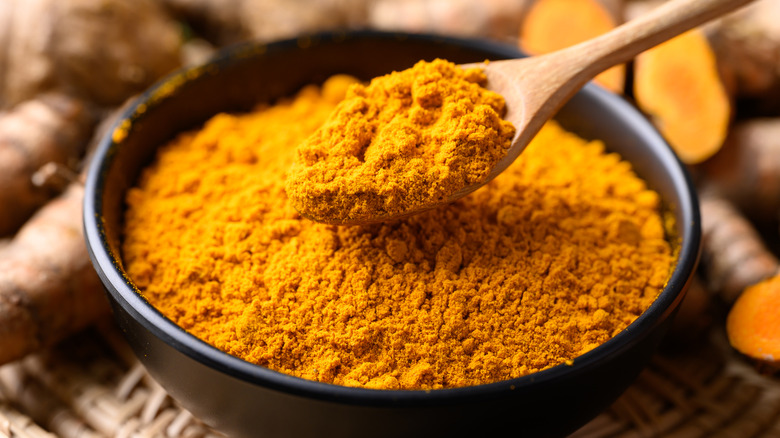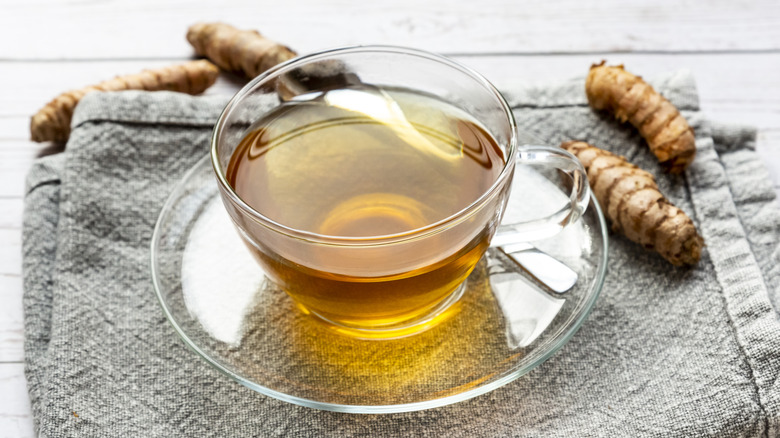
When You Drink Turmeric Every Day, Here’s What Happens To Your Neurological Health – Health Digest
Take a peek into your grandmother’s spice rack, and you’ll likely find an old jar of turmeric tucked away. Known for adding flavor and color to curries, rice, and soups, turmeric is now making waves for its potential health benefits. Today, you’ll see turmeric capsules in the supplement aisle, fresh turmeric root near the ginger in grocery stores, and even turmeric juice shots for a quick health boost.
Turmeric’s health reputation largely comes from its ability to reduce inflammation, which can benefit your brain health. The magic ingredient in turmeric is curcumin, a powerful polyphenol. According to a 2023 review in Integrative Medicine Research, curcumin helps block certain proteins in the brain that cause inflammation — inflammation that can damage brain cells and contribute to neurodegenerative diseases like Alzheimer’s, Parkinson’s, and multiple sclerosis.
But curcumin doesn’t stop there. It also acts as an antioxidant, protecting your brain from harmful molecules, and helps regulate neurotransmitters like serotonin and dopamine. A 2010 review in the Indian Journal of Pharmaceutical Sciences suggests turmeric could even work alongside antidepressants to enhance mood by boosting these key brain chemicals.
How turmeric can affect your brain
Curcumin’s benefits for brain health go beyond fighting inflammation and oxidative stress. The 2023 review in Integrative Medicine Research also highlights its role in preventing amyloid plaques, clumps of protein linked to memory loss and cognitive decline. Curcumin helps keep brain cells alive by calming overactive processes and promoting autophagy, a natural cleanup process that clears out damaged proteins and waste. It even prevents harmful immune cells from crossing the blood-brain barrier, which can otherwise lead to brain damage. In studies, curcumin derivatives have shown promise in treating conditions like Alzheimer’s, ALS, migraines, Parkinson’s, and multiple sclerosis.
And those trendy turmeric shots? They might do more than just spice up your day. A 2022 review in Antioxidants found that turmeric may protect the hippocampus, a part of the brain essential for memory and emotions. Turmeric could also improve brain metabolism, boost cognitive function, and even help with depression-related symptoms like lack of motivation or pleasure. While these results are exciting, most studies so far have been on animals, so more human research is needed.
How you can add turmeric to your diet
There’s one challenge with turmeric: Your body doesn’t absorb curcumin very well. On its own, curcumin is quickly broken down and eliminated before it can work its magic. But there are ways to boost its absorption. Pairing turmeric with black pepper, which contains piperine, slows curcumin’s breakdown, according to a 2007 review in Molecular Pharmaceutics. Eating turmeric with fat, like in a meal that includes healthy oils or nuts, can also help your body absorb it better.
Many supplements combine turmeric with piperine to enhance its effectiveness. However, Johns Hopkins Medicine warns that turmeric supplements may increase the risk of kidney stones in people with a family history of the condition. They can also interact with medications like blood thinners, pain relievers, or immunosuppressants, so it’s worth consulting a doctor before starting any supplement.
If you’re looking for an easy way to take turmeric every day, those juice shots could be a good option. Just check the label to see how much turmeric you’re actually getting. If fresh turmeric root is available, try making turmeric tea at home. Simply chop two tablespoons of turmeric root and simmer it in a cup of water for five minutes. Strain and enjoy hot or cold. No fresh turmeric root? No problem. Use two teaspoons of turmeric powder instead.





